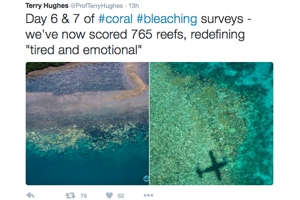The severity of coral bleaching along Australia's Great Barrier Reef, is 3-4 times greater than in 1998 or 2002 reported Terry Hughes to thousands of Twitter followers. Triggered by El Niño's warming, the coral bleaching was not unexpected, but these first reports of changes seen during on-going flyover surveys and disseminated in near-real time still deliver a visual punch. One gets the feeling that our 'borrowed time' is running out.
Regime shifts in coral reefs are a familiar example among resilience researchers. Hughes has numerous publications documenting human impacts on coral reefs over the years, with climate change increasingly recognized as a key driver in a complex system. In a paper published in 2012, Hughes and colleagues proposed the concept of "living on borrowed time, a critical window of time when slow regime shifts might be reversed to prevent the new alternate state from fully eventuating".
In a news story on the aerial coral surveys in Science last week, Ove Hoegh-Guldberg from the University of Queensland, asserts "the only way out of this bind is to rapidly contain further increases in global warming".
Refs:
El Niño's warmth devastating reefs worldwide. Recent aerial surveys of Australia's Great Barrier Reef find massive coral bleaching. By Dennis Normile. 1 April 2016 Science Vol. 352 Iss. 6281: 15-16.
Living dangerously on borrowed time during slow, unrecognized regime shifts. Hughes, T.P. et al. 2013. Trends in Ecology & Evolution 28(3):149-155.
Climate change, human impacts, and the resilience of coral reefs. Hughes, T.P. et al. 2003. Science 301: 929-933.

Keywords: coral bleaching, climate change, El Nino, coral reefs, Great Barrier Reef